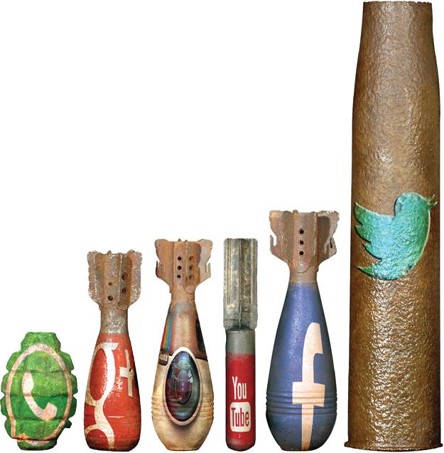 The Islamic State is winning the information war. You can hardly get through a news feed without seeing that the Islamic State is winning the social media war. Simply stated the Islamic State is able to extend their realm of influence far beyond the land they currently control.
The Islamic State is winning the information war. You can hardly get through a news feed without seeing that the Islamic State is winning the social media war. Simply stated the Islamic State is able to extend their realm of influence far beyond the land they currently control.
Unfortunately this is not an unfamiliar headline. Over the last 15 years we have become numb to the fact that the United States isn’t fighting effectively in the information environment. During the onset of Operation Enduring Freedom, Peter Singer a Senior Fellow with Foreign Policy urged the United States to reshape the information environment.
More recently, Richard Halloran stated that: “In the past when soldiers were trained to adjust artillery fire, they were instructed to make bold corrections because the eye often underestimates the distance to the right or left, up or down, that the gun’s aim must be adjusted to hit the target. So it is with strategic communication. To date, the American effort to get into the game has been half-hearted and limited to bureaucratic fixes.”
We can only hope that the bureaucratic efforts end and the Global Engagement Center will deliver on its stated implementation plan . . .
The United States is not making major changes to its strategic communication efforts but the bureaucratic fixes seem endless.
In January of this year, the US Department of State created the Center for Global Engagement giving them the responsibilities of coordinating, integrating, and synchronizing messaging to foreign audiences that undermines the disinformation espoused by violent extremist groups. The previous agency, the Center for Strategic Counterterrorism Communications was charged with similar functions; coordinating, orienting, and informing government-wide foreign communications activities targeted against terrorism and violent extremism guided by the National Strategy for Counterterrorism.
While the bureaucracy continues to plow ahead, others have started to take action. Since December of 2015, Anonymous has targeted and disabled many Islamic State social media efforts. Bae Systems and MTN Government are examples of industry taking action to analyze and interpret Islamic State social media efforts in order to produce actionable intelligence.
It is efforts like these that will lead to the end of the successful social media campaigns employed by the Islamic State. Even efforts made last week by Secretary of State John Kerry when he met with Hollywood executives to discuss the idea of creating propaganda to counter the Islamic State messages may be effective.
We can only hope that the bureaucratic efforts end and the Global Engagement Center will deliver on its stated implementation plan by:
- Seeking out and engaging the best talent, within the technology sector, government and beyond
- Engaging across our government to coordinate, integrate and synchronize counter-terrorism communications directed toward foreign audiences;
- Identifying and enabling international partners with credibility and expertise
- Establishing and implementing a campaign-focused culture;
- Scaling up data science and analytics and using both throughout the design, implementation and evaluation phases of these campaigns;
- Providing seed funding and other support to NGOs and media startups focused on countering violent extremist messaging;
- Identifying gaps in U.S. Government messaging and counter- messaging capabilities directed toward foreign audiences, and recommending steps to resolve them; and
- Sharing information and best practices with U.S. Government agencies focused on the challenge of homegrown violent extremism.
- Amplifying the successes of the Counter-ISIL Coalition in defeating ISIL on both the military and information battlefield.
These are lofty implementation goals. Goals that may not be able to be achieved unless the Center is elevated to a presence on the National Security Council. This presence is required for one simple reason; information is an instrument of national power. Honing this instrument will eventually lead to success and we will see the Islamic State’s social media campaign finally begin to falter.



